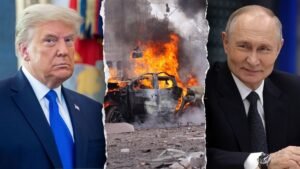Post Content
NATO Secretary-General Jens Stoltenberg sharply criticized China on Tuesday for “bullying its neighbors and threatening Taiwan” and stressed the need for Japan and other democracies to work together with the alliance to defend the international order.
Calling it a “critical moment for NATO and for Japan,” Stoltenberg, who is visiting Tokyo, said China and Russia are “leading an authoritarian pushback against international rules-based order.”
He said trans-Atlantic and Indo-Pacific security are “deeply interconnected,” and a victory by Russian President Vladimir Putin in Ukraine would send a message that authoritarian regimes can achieve their goals through brute force. “This is dangerous,” he said.
“China is watching closely and learning lessons that may influence its future decisions,” Stoltenberg said at a joint news conference with Japanese Prime Minister Fumio Kishida.
“China is substantially building up its military forces including nuclear weapons, bullying its neighbors and threatening Taiwan, trying to control critical infrastructure and spreading misinformation about NATO and the war in Ukraine,” Stoltenberg said. “China is not our adversary, but we must understand the scale of the challenge and work together to address it.”
Stoltenberg’s direct criticism of China contrasted with Kishida’s more indirect expression of opposition to any one-sided changes by force to the status quo in the East and South China Seas.
Japan, already a close ally of the United States, has in recent years expanded its military ties with other Indo-Pacific nations as well as with Britain, Europe and NATO amid a growing security threat from China and North Korea.
NATO Secretary-General Jens Stoltenberg, left, and Japan’s Prime Minister Fumio Kishida shake hands after holding a joint media briefing on Jan. 31, 2023, in Tokyo, Japan.
(Takashi Aoyama/Pool Photo via AP)
It was quick to join in U.S.-led economic sanctions against Russia’s war in Ukraine and provided humanitarian aid and non-combative defense equipment for Ukrainians. That was mainly because of Japanese fear that Russian aggression in Europe could be reflected in Asia, where concerns are growing over growing Chinese assertiveness and escalating tensions over its claim to Taiwan.
At the news conference, Kishida welcomed NATO’s deepening interest and engagement in the Indo-Pacific region and announced that Japan will open a delegation office at NATO and plans to regularly attend council meetings and chiefs of defense meetings to promote closer communication between Japan and the alliance.
CHINA URGES KEVIN MCCARTHY TO AVOID REPEATING NANCY PELOSI’S TRIP TO TAIWAN
Kishida said he and Stoltenberg agreed to advance ties in areas such as cyberspace, space, disinformation, and critical and emerging technology.
In a joint statement issued later, the two leaders raised concern about Russia’s growing military cooperation with China, including joint drills around Japan’s coasts. They urged China to cooperate “constructively” with international efforts for arms control, disarmament and non-proliferation, and stressed the importance of “peace and stability across the Taiwan Strait.”
Japan’s government issued a new national security strategy in December stating its determination to build up its military and deploy long-range missiles to preempt enemy attacks, in a major break from its post-World War II principle that limited itself to self-defense. Japan also plans to nearly double its defense spending over five years and hopes to further ease restrictions on arms exports to strengthen its defense industry.
CLICK HERE TO GET THE FOX NEWS APP
Stoltenberg arrived in Japan late Monday from South Korea, where he called for Seoul to provide direct military support to Ukraine to help it fight off the prolonged Russian invasion. So far, Seoul has only provided humanitarian aid and other support, citing a long-standing policy of not supplying weapons to countries in conflict.
North Korea condemned Stoltenberg’s visits to South Korea and Japan, saying that NATO was trying to put its “military boots in the region” and attempting to pressure America’s Asian allies into providing weapons to Ukraine.
In a statement released by the state-run Korean Central News Agency, North Korea criticized increasing cooperation between NATO and U.S. allies in Asia as a process to create an “Asian version of NATO” that would raise tensions in the region.





